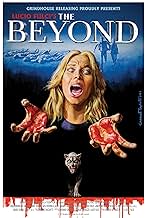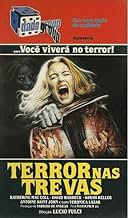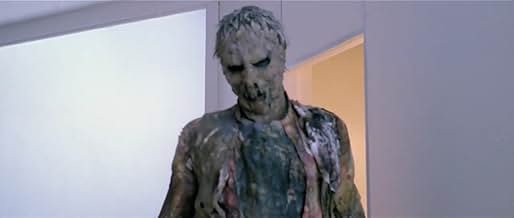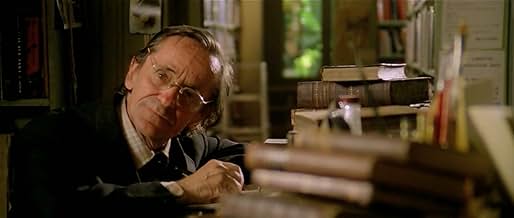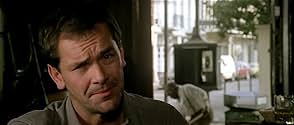IMDb RATING
6.6/10
27K
YOUR RATING
A young woman inherits an old hotel in Louisiana where, following a series of supernatural "accidents", she learns that the building was built over one of the entrances to Hell.A young woman inherits an old hotel in Louisiana where, following a series of supernatural "accidents", she learns that the building was built over one of the entrances to Hell.A young woman inherits an old hotel in Louisiana where, following a series of supernatural "accidents", she learns that the building was built over one of the entrances to Hell.
Catriona MacColl
- Liza Merril
- (as Katherine MacColl)
Cinzia Monreale
- Emily
- (as Sarah Keller)
Calogero Azzaretto
- Zombie at Hospital
- (uncredited)
Pino Colizzi
- Voce dell'aldilà
- (uncredited)
Ottaviano Dell'Acqua
- Zombie at Hospital
- (uncredited)
Roberto Dell'Acqua
- Glass-Smashing Zombie
- (uncredited)
Lucio Fulci
- Town Clerk
- (uncredited)
Featured reviews
A Louisiana hotel is discovered to be one of the seven gateways to hell. The other world does not wish the hotel opened, so a horde of zombies is unleashed on the town. Also, there is a character named Joe the Plumber.
Starring the lovely and talented Catriona MacColl, directed by Lucio Fulci and written by Dardano Sacchetti... who has a virtual monopoly on Italian horror. This is a great cast and crew.
Howard Maxford says the film's "occasional visual flair may commend it to Fulci completists." I was under the impression this was considered one of Fulci's stronger films, but his comment makes me wonder.
Indeed, the visuals are Fulcis' strong point. An eye getting torn out, a crucifixion, eye piercing, shards of glass, tarantulas, acid... he does the best gore one can expect from a low budget film. (Thank you, effects wizard Giannetto de Rossi.) Luca Palmerini, who calls the film "first rate", claims there are many references to classic Italian horror, the films of Tobe Hooper and Winner, and the literature of Graegorius and Sidney. These were clearly over my head, but only add to the greatness of the film.
My horror idol Jon Kitley sums it up best: "Fulci isn't interested in a coherent storyline, with all the loose ends tidied up at the end of 90 minutes. He is more concerned with creating a series of sequences meant to scare you. Horrify you. And hopefully, even gross you out." This fits Fulci perfectly, but also is not a bad way to describe Italian horror in general. (Fulci freely admits the film has "no logic" and is "plotless".) I love the smile Catriona MacColl flashes as David Warbeck tries to put a bullet in the front of a pistol while in the elevator. Clearly, anyone who knows how to use a gun would not load it this way. But also, Fulci could have cut the film a second earlier and avoided the momentary smile that appears in an otherwise tense and terrifying scene.
Any die-hard horror fan or fan of Italian horror must see this film. It is a true classic, regardless of the fact it may be overlooked by some horror historians (Italian horror has always taken a backseat to American or British horror, and even among Italian films, Fulci takes a backseat to Argento.) Check this one out.
Starring the lovely and talented Catriona MacColl, directed by Lucio Fulci and written by Dardano Sacchetti... who has a virtual monopoly on Italian horror. This is a great cast and crew.
Howard Maxford says the film's "occasional visual flair may commend it to Fulci completists." I was under the impression this was considered one of Fulci's stronger films, but his comment makes me wonder.
Indeed, the visuals are Fulcis' strong point. An eye getting torn out, a crucifixion, eye piercing, shards of glass, tarantulas, acid... he does the best gore one can expect from a low budget film. (Thank you, effects wizard Giannetto de Rossi.) Luca Palmerini, who calls the film "first rate", claims there are many references to classic Italian horror, the films of Tobe Hooper and Winner, and the literature of Graegorius and Sidney. These were clearly over my head, but only add to the greatness of the film.
My horror idol Jon Kitley sums it up best: "Fulci isn't interested in a coherent storyline, with all the loose ends tidied up at the end of 90 minutes. He is more concerned with creating a series of sequences meant to scare you. Horrify you. And hopefully, even gross you out." This fits Fulci perfectly, but also is not a bad way to describe Italian horror in general. (Fulci freely admits the film has "no logic" and is "plotless".) I love the smile Catriona MacColl flashes as David Warbeck tries to put a bullet in the front of a pistol while in the elevator. Clearly, anyone who knows how to use a gun would not load it this way. But also, Fulci could have cut the film a second earlier and avoided the momentary smile that appears in an otherwise tense and terrifying scene.
Any die-hard horror fan or fan of Italian horror must see this film. It is a true classic, regardless of the fact it may be overlooked by some horror historians (Italian horror has always taken a backseat to American or British horror, and even among Italian films, Fulci takes a backseat to Argento.) Check this one out.
I guess I must have been in a bad mood when I first watched this as I really didn't like it. Now I've watched it again (simply because I'd forgotten I'd even watched it, I really enjoyed it - like I've done so with many (so-bad-they're-good) Italian horror films of the eighties. It's about a hotel in Louisiana which is basically a 'hell-mouth' and, seeing as Buffy probably wasn't born when this was made, it's up to a woman who wants to refurbish it and a doctor who can only shoot a zombie in the head every three shots (I counted!).
It's a bit weird where there are some secondary characters who just wander around talking badly. Yes, it's dubbed in many places - I noticed that severely when I first watched it and it's still as overly-dramatic now. In typical Italian horror movie style, it's almost deliberately all over the place and the sharp edits which give the film a truly disconcerting atmosphere. Plus there are some scenes which are almost funny while being bizarre - like when a woman seems to freak out because a beaker of water overturns in slow motion (and she then comes off worse, believe it or not).
And there's the gore - which was damn gool if you're into 'claret' and generally want to see a hundred and one different ways of inflicting pain on eyeballs. Back in the eighties (before every 'head-shot' was computer generated) film-makers had to come up with new and interesting ways of doing gore on the cheap. And, to be fair, that's one area where The Beyond succeeded. The gore wasn't just gore, but also pretty inventive, providing me with more than a few moments of on-screen horror that I've never seen before.
I'm glad I've given this film another go as - this time - I found it really entertaining and it's an example that you clearly need to be in the right mood for the right film.
It's a bit weird where there are some secondary characters who just wander around talking badly. Yes, it's dubbed in many places - I noticed that severely when I first watched it and it's still as overly-dramatic now. In typical Italian horror movie style, it's almost deliberately all over the place and the sharp edits which give the film a truly disconcerting atmosphere. Plus there are some scenes which are almost funny while being bizarre - like when a woman seems to freak out because a beaker of water overturns in slow motion (and she then comes off worse, believe it or not).
And there's the gore - which was damn gool if you're into 'claret' and generally want to see a hundred and one different ways of inflicting pain on eyeballs. Back in the eighties (before every 'head-shot' was computer generated) film-makers had to come up with new and interesting ways of doing gore on the cheap. And, to be fair, that's one area where The Beyond succeeded. The gore wasn't just gore, but also pretty inventive, providing me with more than a few moments of on-screen horror that I've never seen before.
I'm glad I've given this film another go as - this time - I found it really entertaining and it's an example that you clearly need to be in the right mood for the right film.
This film has great atmosphere. There are some great moments and elements here.
I like it's approach to horror. To me it inspires the imagination.
It holds up as a gory film, even today. Which is an accomplishment.
However this film is not for everyone. You have to be able to appreciate older movies. And have a little open mindedness. But it does hold up well.
With movies like this, with giallo in particular, it won't be appreciated by some close-minded modern viewers.
Because this film works on inspiring the imagination.
With movies like this, it taps into that sense of wonder connected with fear and mystery.
A capacity for wonder is sorely lacking in our day.
Why this film works well is that it taps into wonder, fear and mystery. It implies more than it shows.
In usual Fulci style, it zooms up and focuses on the gore instead of cutting away from it, or whatever. Which I really appreciate.
But if you truly understand this movie, the impact comes not from gore but from what is implied in the story. And the atmosphere.
The film has a great ending which really makes the film for me.
Now it is a little bit of a slow burn. But even in that there is death and gore happening so it certainly shouldn't be considered boring.
But it takes time to build into the crescendo of the final act.
Some might consider it dated but in actually it has that charm of time. It has this late 70s horror vibe that can be really enjoyable for a genre fan.
(Yes, I know it was made in '81)
Ultimately, an objectively great film.
But I would only recommend it to open minded, perceptive viewers who can appreciate it like it deserves.
I like it's approach to horror. To me it inspires the imagination.
It holds up as a gory film, even today. Which is an accomplishment.
However this film is not for everyone. You have to be able to appreciate older movies. And have a little open mindedness. But it does hold up well.
With movies like this, with giallo in particular, it won't be appreciated by some close-minded modern viewers.
Because this film works on inspiring the imagination.
With movies like this, it taps into that sense of wonder connected with fear and mystery.
A capacity for wonder is sorely lacking in our day.
Why this film works well is that it taps into wonder, fear and mystery. It implies more than it shows.
In usual Fulci style, it zooms up and focuses on the gore instead of cutting away from it, or whatever. Which I really appreciate.
But if you truly understand this movie, the impact comes not from gore but from what is implied in the story. And the atmosphere.
The film has a great ending which really makes the film for me.
Now it is a little bit of a slow burn. But even in that there is death and gore happening so it certainly shouldn't be considered boring.
But it takes time to build into the crescendo of the final act.
Some might consider it dated but in actually it has that charm of time. It has this late 70s horror vibe that can be really enjoyable for a genre fan.
(Yes, I know it was made in '81)
Ultimately, an objectively great film.
But I would only recommend it to open minded, perceptive viewers who can appreciate it like it deserves.
If you think Dario Argento doesn't give a damn about coherent plots, check out Lucio Fulci! 'The Beyond' does have a (Lovecraftian) plot as such - a woman inherits a hotel in Louisiana that contains one of the doorways to Hell - but that is basically an excuse for Fulci to string together a series of fantastic and frequently gory images. These include zombie attacks, eye gougings, a better dog attack scene than 'Suspiria', the crucifixion of a Satanist, and a sequence involving tarantulas which has to be one of the high points of horror, anywhere, anytime.
'The Beyond' is sensational and a bona fide modern horror classic. Absolutely essential viewing!
'The Beyond' is sensational and a bona fide modern horror classic. Absolutely essential viewing!
The idea of a gateway to hell being opened has potential but this movie doesn't pull it off. The story lacks details, the characters trait's are not developed enough, and the dialog is utterly ridiculous ("Attack Dickie! Attack!"). The only reason someone might want to see this movie is because of the gore, which the movie has a lot of, but some scenes are unrealistic. I advise people that aren't fans of Fulci's work to steer clear.
Did you know
- TriviaThe DVD commentary by actors Catriona MacColl and David Warbeck was recorded two weeks before Warbeck's death from cancer. In the commentary he talks about his illness.
- Goofs(at around 26 mins) Sign outside the morgue reads "Do Not Entry".
- Quotes
[last lines]
Narrator: And you will face the sea of darkness, and all therein that may be explored.
- Crazy creditsThe end titles of the U.S. version, "7 Doors of Death" are full of incorrect billings.
David Warbeck's character John McCabe is billed as "Doc." Antonie Saint-John (here called Tony Saint-John) is billed as Joe the Plumber. He actually played Schweick. Veronica Lazar is billed as playing the little girl, Jill. She was Martha, the housekeeper. Jill was played by Maria Pia Marsala. Someone named "Philip Ostrow" is billed as playing Arthur, Martha's son. He was played by Giampaolo Saccarola. Martha is billed as being played by someone named Margaret Lund. She was played by Veronica Lazar. Mary-Ann (billed here as "Joe's Wife") is billed as being played by someone named Helen Pierce. She was played by Laura De Marchi. Schweick (billed here as "Sweik") is billed as being played by someone named Robert Leahy. He was played by Antoine Saint-John. Dr. Harris is billed as being played by someone named Jim Barrett. He was played by Al Cliver.
If you count Catriona MacColl and Cinzia Monreale's real names not being used, every single cast listing in the "7 Doors of Death" version is wrong in some way or another.
- Alternate versionsThe German DVD released by Astro in 2001 contains both the color and b/w pre-credit sequence (selectable via menu). This release is also completely uncut.
- ConnectionsEdited into Through Eyes of the Dead (1999)
- SoundtracksEmily's Theme
Piano solo performed by Michael Valenti
[Appears only in the US version]
Details
- Release date
- Country of origin
- Language
- Also known as
- Las siete puertas del infierno
- Filming locations
- Production company
- See more company credits at IMDbPro
Box office
- Budget
- $400,000 (estimated)
- Gross US & Canada
- $123,843
- Opening weekend US & Canada
- $18,148
- Jun 14, 1998
- Gross worldwide
- $123,843
Contribute to this page
Suggest an edit or add missing content



